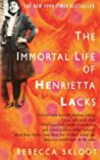
But I tell you one thing, I don’t want to be immortal if it mean living forever, cause then everybody else just die and get old in front of you while you stay the same, and that’s just sad.
That is one heck of a story. In a nutshell: decades ago, there was a woman named Henrietta Lacks who developed cancer. While treating her, a doctor took a sample of her cells, which turned out to be rather unusual. Unlike any other cells found before (or since?), they never died. They just kept growing and dividing and living forever.
Henrietta’s were different: they reproduced an entire generation every twenty-four hours, and they never stopped. They became the first immortal human cells ever grown in a laboratory.
This was huge for basically the entire field of biology/medicine/etc and should (in a better world) have been huge for her family and legacy. Instead, the world forgot her name and her family got basically nothing.
She’s the most important person in the world and her family living in poverty. If our mother is so important to science, why can’t we get health insurance?
The Immortal Life of Henrietta Lacks is the story of Henrietta Lacks, her immortal cells, her family, and the reporter with the awesome name trying to track the whole story down.
That core of the book is fascinating and wonderful. Science really is more complicated and goes far deeper than I ever expect and the story of how it all fits together gets all sorts of complicated. But for better or for worse, the book doesn’t just cover the science and history, but also has the human element. And the people in this story are exemplars of how race and poverty and history manage to ruin just about everything. Man the world is screwed up; and it makes for a hard to read story.
Black scientists and technicians, many of them women, used cells from a black woman to help save the lives of millions of Americans, most of them white. And they did so on the same campus—and at the very same time—that state officials were conducting the infamous Tuskegee syphilis studies.
Overall, a hard read, but well worth it.